The Deeper Thinking Podcast
The Deeper Thinking Podcast The Deeper Thinking Podcast offers a space where philosophy becomes a way of engaging more fully and deliberately with the world. Each episode explores enduring and emerging ideas that deepen how we live, think, and act. We follow the spirit of those who see the pursuit of wisdom as a lifelong project of becoming more human, more awake, and more responsible. We ask how attention, meaning, and agency might be reclaimed in an age that often scatters them. Drawing on insights stretching across centuries, we explore how time, purpose, and thoughtfulness can quietly transform daily existence. The Deeper Thinking Podcast examines psychology, technology, and philosophy as unseen forces shaping how we think, feel, and choose, often beyond our awareness. It creates a space where big questions are lived with—where ideas are not commodities, but companions on the path. Each episode invites you into a slower, deeper way of being. Join us as we move beyond the noise, beyond the surface, and into the depth, into the quiet, and into the possibilities awakened by deeper thinking.
Episodes
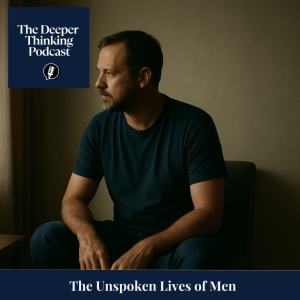
Thursday Apr 24, 2025
Thursday Apr 24, 2025
The Unspoken Lives of Men
The Deeper Thinking Podcast
What does it mean to witness a masculinity that doesn’t perform? And how do we make space for forms of strength that don’t announce themselves? Drawing from the relational ethics of bell hooks and the radical attentiveness of Simone Weil, this episode listens for what emerges when masculine identity is neither defended nor performed—but allowed to soften.
This is not a critique of men, nor a celebration of them—it is an invitation to witness what remains unspoken. From the disorientation that follows when the cultural scripts no longer fit, to the quiet dignity of those who choose presence over posture, we ask: what does liberation sound like when it doesn’t shout? How might silence itself be a form of love?
Engaging with the feminist thought of Sara Ahmed and Amia Srinivasan, and the border-thinking of Gloria Anzaldúa, the episode traces how disenfranchised masculinity is not the absence of power, but the quiet space where new ways of being begin to form. We pay attention to not-knowing—not as weakness, but as a kind of ethical presence.
For anyone questioning what it means to be a man in a world where performance is no longer enough, this episode is a meditation on restraint, vulnerability, and the strength that does not seek applause.
Why Listen?
What happens when the scripts for being a man no longer fit
Why not-knowing can be a new kind of presence
The emotional terrain of disenfranchised masculinity
How thinkers like hooks, Weil, Srinivasan, Ahmed, and Anzaldúa expand the conversation around love, masculinity, and care
Listen On:
YouTube
Spotify
Apple Podcasts
Bibliography
hooks, bell. The Will to Change: Men, Masculinity, and Love. New York: Washington Square Press, 2004.
Weil, Simone. Gravity and Grace. Translated by Emma Craufurd. London: Routledge, 2002.
Ahmed, Sara. Living a Feminist Life. Durham: Duke University Press, 2017.
Srinivasan, Amia. The Right to Sex: Feminism in the Twenty-First Century. New York: Farrar, Straus and Giroux, 2021.
Anzaldúa, Gloria. Borderlands/La Frontera: The New Mestiza. San Francisco: Aunt Lute Books, 1999.
Bibliography Relevance
bell hooks: Connects masculinity to love and liberation as intertwined forces.
Simone Weil: Reframes attention as a devotional act—core to witnessing.
Sara Ahmed: Tracks the affective politics of gendered life and refusal.
Amia Srinivasan: Pushes the boundaries of consent, power, and gendered norms.
Gloria Anzaldúa: Opens a space for hybrid identities and new modes of belonging beyond masculine borders.
What if the strongest thing a man could do—is not to act, but to stay?
#Masculinity #bellhooks #SimoneWeil #Feminism #Care #Attention #Gender #Anzaldúa #TheDeeperThinkingPodcast #Liberation #DisenfranchisedMasculinity #NotKnowing #Presence #Love
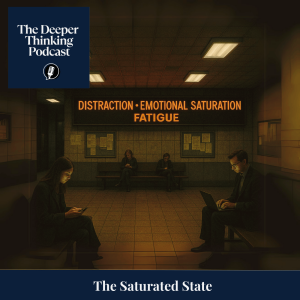
Thursday Apr 24, 2025
Thursday Apr 24, 2025
The Saturated State: Mood, Consent, and the Performance of Power
The Deeper Thinking Podcast
We are governed not by force alone, but by saturation—of noise, of image, of pace. This episode explores how distraction, emotional overload, and political fatigue are not accidents of the moment but tools of governance. It asks what happens when democracy becomes aesthetic, memory becomes unstable, and speech becomes calibration rather than expression.
Power today no longer declares. It performs. Drawing on the work of Byung-Chul Han, who examines the psychic toll of hyper-visibility, and Lauren Berlant, who identifies the slow erosion of public optimism, this episode explores how governance now operates atmospherically—through mood, through rhythm, and through exhaustion.
With Mark Fisher’s critique of capitalist realism and Simone Weil’s notion of attention as moral discipline, we ask what it means to hold shape when institutions collapse inward. What forms of refusal remain in a world saturated not by fear, but by feeling?
Why Listen?
Understand how emotion, repetition, and pace are used as instruments of governance
Engage with the concept of saturation as political atmosphere, not just media effect
Examine how aesthetic forms can erode civic agency and public optimism
Learn how thinkers like Han, Berlant, Fisher, and Weil reframe attention as resistance
Listen On:
YouTube
Spotify
Apple Podcasts
Bibliography
Berlant, Lauren. Cruel Optimism. Durham, NC: Duke University Press, 2011.
Fisher, Mark. Capitalist Realism: Is There No Alternative? Winchester, UK: Zero Books, 2009.
Han, Byung-Chul. The Burnout Society. Stanford, CA: Stanford University Press, 2015.
Weil, Simone. Gravity and Grace. Translated by Emma Crawford and Mario von der Ruhr. London: Routledge, 2002.
Bibliography Relevance
Lauren Berlant: Grounds the concept of “cruel optimism” as a lens for understanding emotional governance
Byung-Chul Han: Frames transparency and hyper-communication as coercive norms of contemporary life
Mark Fisher: Diagnoses the psychic effects of neoliberal realism as cultural saturation and inertia
Simone Weil: Offers attention as an ethical stance, enabling resistance through care and perception
To endure saturation is not to escape it, but to find new rhythms beneath it. Resistance, here, is a way of listening.
#GovernanceByMood #Berlant #ByungChulHan #CapitalistRealism #SimoneWeil #TheDeeperThinkingPodcast #AestheticPower #EmotionalOverload #Philosophy #AttentionAsResistance
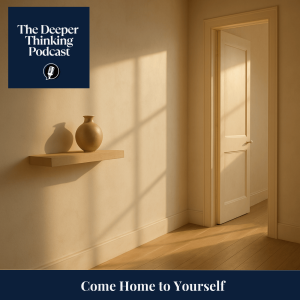
Thursday Apr 24, 2025
Thursday Apr 24, 2025
Come Home to Yourself: Boundaries, Burnout, and the Rhythm of Return
The Deeper Thinking Podcast
What does it mean to return to yourself—not as a goal, but as a rhythm? This episode is a translation of an inner voice: the one that waits beneath survival, beyond performance, under the noise. It doesn’t instruct. It doesn’t explain. It listens. And when we listen back, something begins to soften.
Drawing on the emotional textures of slow growth, quiet resistance, and relational repair, we explore how healing isn’t a triumph but a return. We question clarity as a requirement, challenge motivation as a moral standard, and examine how joy, pain, and presence can coexist without apology.
With echoes of Brené Brown, Sara Ahmed, and Pádraig Ó Tuama, this episode isn’t here to tell you what to feel. It’s here to keep you company while you feel it. No fixing. No striving. Just a steady invitation back to the truth beneath it all.
Why Listen?
For a companionable, poetic audio essay that moves at the speed of breath
To explore how boundaries, belonging, and burnout intertwine with care
To learn how to live from softness without collapsing
To feel reminded—not instructed—of what’s already true in you
Listen On:
YouTube
Spotify
Apple Podcasts
Further Reading
Ahmed, Sara. Living a Feminist Life. Durham: Duke University Press, 2017.
Anzaldúa, Gloria. Borderlands/La Frontera: The New Mestiza. 4th ed. San Francisco: Aunt Lute Books, 2012.
Weil, Simone. Gravity and Grace. Translated by Emma Crawford and Mario von der Ruhr. London: Routledge, 2002.
Bibliography Relevance
Sara Ahmed: Explores the politics and ethics of emotion, embodiment, and care, anchoring the episode’s refusal of emotional instruction.
Gloria Anzaldúa: Offers a framework for inner multiplicity and border-being, underscoring the porousness of personal return.
Simone Weil: Centers attention as an act of love, framing presence and listening as sacred disciplines rather than performative acts.
Not all healing requires movement. Some asks you to stay—gently, faithfully—with yourself.
#Burnout #Boundaries #Healing #Softness #SaraAhmed #GloriaAnzaldúa #SimoneWeil #PhilosophyOfCare #Attention #EmotionalEthics #TheDeeperThinkingPodcast #Gentleness #Return #Companionship #Presence
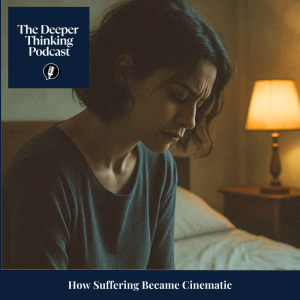
Tuesday Apr 22, 2025
Tuesday Apr 22, 2025
How Suffering Became Cinematic
The Deeper Thinking Podcast
We are often told that suffering is meaningful. That trauma refines us. That resilience is beautiful. This episode refuses all of it. We listen not for inspiration but for rupture—for the contradictions that emerge when romanticized stories are interrupted by real, unresolved lives.
Here, caregiving isn’t framed as devotion—it’s structural disappearance. Neurodivergence is not charming—it’s socially masked exhaustion. Homelessness isn’t freedom—it’s logistical, economic, and ontological exclusion. Romanticization is revealed as a quiet violence, and what remains are not metaphors, but fragments.
Drawing from thinkers like Simone Weil, Fred Moten, Sara Ahmed, and Giorgio Agamben, we explore contradiction not as something to fix, but as something to hold. The episode resists closure. It listens for the residue of lives miss red and refuses to translate them into insight. This is not a story. It is a structure.
Why Listen?
Hear stories that remain outside the frame of redemption
Understand how romanticization functions as erasure
Engage contradiction as an ethical and philosophical form
Learn from Weil, Moten, Caruth, Federici, Butler
Listen On:
YouTube
Spotify
Apple Podcasts
Bibliography
Ahmed, Sara. Living a Feminist Life. Duke University Press, 2017.
Agamben, Giorgio. Homo Sacer. Stanford University Press, 1998.
Butler, Judith. Precarious Life. Verso Books, 2004.
Caruth, Cathy. Unclaimed Experience. Johns Hopkins University Press, 1996.
Federici, Silvia. Re-enchanting the World. PM Press, 2019.
Moten, Fred. In the Break. University of Minnesota Press, 2003.
Weil, Simone. Gravity and Grace. Routledge, 2002.
This is not an episode about meaning. It’s about the refusal to make suffering bearable through story.
#Romanticization #Contradiction #Philosophy #SimoneWeil #FredMoten #SaraAhmed #JudithButler #CathyCaruth #SilviaFederici #Agamben #DeeperThinking #OntologicalExclusion #UnresolvedLives #Trauma #NarrativeViolence
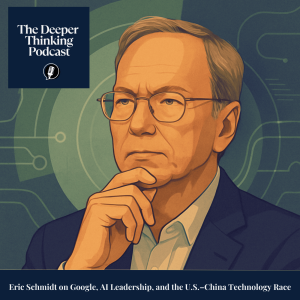
Tuesday Apr 22, 2025
Tuesday Apr 22, 2025
Eric Schmidt, Google, and the Global Stakes of Artificial Intelligence
The Deeper Thinking Podcast
In this episode, we explore Eric Schmidt’s vision of artificial intelligence not as an abstract future or market force—but as a geopolitical condition already underway. More than a profile, this is a meditation on temperament, strategy, and the ethics of speed. How does one of the digital era’s most influential minds think about leadership, trust, and the fragility of institutional strength under competitive pressure?
We trace the psychological and political architecture of the AI race, following Schmidt’s distinctions between founders and executives, startups and nations, urgency and judgment. His insights are neither nostalgic nor alarmist—but sharpened by decades of operational power. The result is a vision of intelligence—human and artificial—that demands not just innovation, but care.
Drawing from thinkers like Paul Virilio, Byung-Chul Han, Hannah Arendt, and Bernard Stiegler, we ask: how do we govern systems that learn faster than we can legislate? What happens when startup logic becomes geopolitical logic? And can our values survive the migration into code?
This is an episode about consequence, not just capability. About relevance, not just leadership. About what it means to build—and deserve—the future.
Why Listen?
Understand how Eric Schmidt reads global AI competition through infrastructure, not ideology
Explore the ethics of institutional power in the age of AGI and algorithmic acceleration
Examine the risks of value displacement as AI development migrates across geopolitical systems
Engage with thinkers like Virilio, Arendt, and Stiegler on speed, care, and the architectures of power
Listen On:
YouTube
Spotify
Apple Podcasts
Bibliography
Schmidt, Eric, Henry Kissinger, and Daniel Huttenlocher. The Age of AI: And Our Human Future. Boston: Little, Brown and Company, 2021.
Virilio, Paul. Speed and Politics: An Essay on Dromology. Trans. Mark Polizzotti. Los Angeles: Semiotext(e), 2006.
Han, Byung-Chul. The Transparency Society. Stanford: Stanford University Press, 2015.
Arendt, Hannah. The Human Condition. 2nd ed. Chicago: University of Chicago Press, 1998.
Moten, Fred. In the Break: The Aesthetics of the Black Radical Tradition. Minneapolis: University of Minnesota Press, 2003.
Stiegler, Bernard. Technics and Time, 1: The Fault of Epimetheus. Trans. Richard Beardsworth and George Collins. Stanford: Stanford University Press, 1998.
Bibliography Relevance
Eric Schmidt: Frames the episode’s central inquiry into leadership, foresight, and AI governance
Paul Virilio: Provides the critical lens of speed as both advantage and hazard in political systems
Byung-Chul Han: Explores the tensions between transparency, performance, and trust in techno-political systems
Hannah Arendt: Offers a moral framework for understanding the intersection of action, freedom, and consequence
Bernard Stiegler: Illuminates how technical systems shape—and displace—human temporality and responsibility
What if the most urgent question is not what we’re building—but who we trust to notice what it means?
#EricSchmidt #GoogleAI #ArtificialIntelligence #AILeadership #AGI #Geopolitics #ChinaUSA #PaulVirilio #ByungChulHan #HannahArendt #BernardStiegler #AIethics #FutureOfIntelligence #TheDeeperThinkingPodcast #TechGovernance #PhilosophyOfTechnology
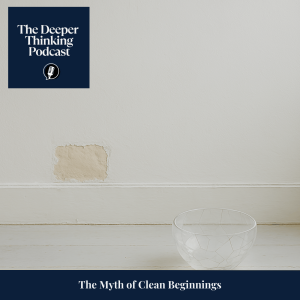
Friday Apr 18, 2025
Friday Apr 18, 2025
The Myth of Clean Beginnings
The Deeper Thinking Podcast
We like to believe in clean slates. In fresh starts and unmarked beginnings. But what if the beginning was never clean? What if every attempt at origin is already layered—paint over plaster, gesture over habit, language over silence? This episode explores how beginnings are not ruptures, but rearrangements. It reveals how the past is never fully erased, but sedimented—shaping what follows, quietly and insistently.
Origin stories simplify. They conceal the friction beneath—what we thought we had painted over, outgrown, erased. But as Sara Ahmed reminds us, orientations stick not because we choose them, but because spaces are shaped to hold them. And Gloria Anzaldúa teaches us that contradiction is not an error in knowing—it’s a condition of it.
There is no pure beginning. There is only rearrangement. As Simone Weil insists, attention is an act of devotion. And to pay attention to what remains—to the unchosen, the unfinished, the inconvenient—is to acknowledge that newness is not clean. It is contingent. In this episode, we ask what it means to begin in a world already built. To inherit structure without pretending we invented it. And to find meaning in what cannot be fully removed.
Why Listen?
The philosophy of beginning as rearrangement, not rupture
How inheritance shapes perception, design, and memory
Why origin stories often conceal more than they reveal
The ethical and aesthetic stakes of what we try to erase
Further Reading
As an affiliate, we may earn from qualifying purchases through these links.
Living a Feminist Life by Sara Ahmed — How space, repetition, and institutional memory shape our bodies. Amazon link
Gravity and Grace by Simone Weil — On the spiritual and structural implications of attention. Amazon link
Borderlands/La Frontera by Gloria Anzaldúa — A foundational text on identity, hybridity, and epistemic rupture. Amazon link
Listen On:
YouTube
Spotify
Apple Podcasts
Bibliography
Ahmed, Sara. *Living a Feminist Life*. Durham: Duke University Press, 2017.
Weil, Simone. *Gravity and Grace*. Translated by Emma Craufurd. London: Routledge, 2002.
Anzaldúa, Gloria. *Borderlands/La Frontera: The New Mestiza*. San Francisco: Aunt Lute Books, 1987.
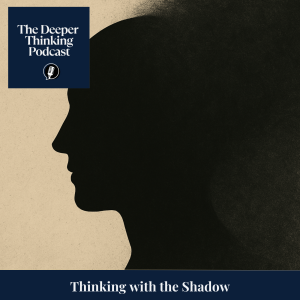
Friday Apr 18, 2025
Friday Apr 18, 2025
The Shadow and the Self
The Deeper Thinking Podcast
This episode explores the shadow not as pathology, but as method—a recursive structure of return that challenges what we know about selfhood, truth, and coherence. What happens when we stop fleeing the parts of ourselves we’ve exiled? When we no longer moralise discomfort, but attend to it? The shadow is not a flaw—it is an epistemic threshold. A way of listening to what the psyche does not yet know how to say.
Drawing on thinkers like Carl Jung, Jacques Lacan, and Martha Nussbaum, the episode reframes shadow work as a philosophical commitment to remain—near contradiction, near discomfort, near what cannot be resolved. Through this lens, care becomes structure, silence becomes data, and philosophy returns to its ethical origin: presence.
As Gloria Anzaldúa reminds us, contradiction is not a threat to meaning, but its condition. And Judith Butler shows that vulnerability is not the end of thought, but its ground. The essay resists closure, avoids performance, and invites something rarer: to think as an act of fidelity, to feel as a form of recognition, to remain—not to resolve.
Why Listen?
Philosophy as a practice of shadow integration and self-accountability
How repression, projection, and silence shape both personal and political worlds
Theorist-led inquiry into ethics, attention, and contradiction
A rigorous, lyrical essay format designed for return listening
Further Reading
As an affiliate, we may earn from qualifying purchases through these links.
The Archetypes and the Collective Unconscious by Carl Jung — A foundational account of the shadow and its role in psychic integration. Amazon link
Giving an Account of Oneself by Judith Butler — On ethics, exposure, and the limits of self-knowledge. Amazon link
Upheavals of Thought by Martha Nussbaum — How emotions disclose values and shape moral attention. Amazon link
Listen On:
YouTube
Spotify
Apple Podcasts
Bibliography
Ahmed, Sara. The Cultural Politics of Emotion. Edinburgh: Edinburgh University Press, 2004.
Anzaldúa, Gloria. Borderlands/La Frontera: The New Mestiza. San Francisco: Aunt Lute Books, 1987.
Arendt, Hannah. Eichmann in Jerusalem: A Report on the Banality of Evil. New York: Viking Press, 1963.
Buber, Martin. I and Thou. Translated by Ronald Gregor Smith. New York: Charles Scribner’s Sons, 1958.
Butler, Judith. Precarious Life: The Powers of Mourning and Violence. London: Verso, 2004.
Cavarero, Adriana. Relating Narratives: Storytelling and Selfhood. Translated by Paul A. Kottman. London: Routledge, 2000.
Foucault, Michel. Power/Knowledge: Selected Interviews and Other Writings, 1972–1977. Edited by Colin Gordon. New York: Pantheon Books, 1980.
hooks, bell. All About Love: New Visions. New York: William Morrow, 2000.
Jung, Carl Gustav. The Archetypes and the Collective Unconscious. Translated by R.F.C. Hull. Princeton: Princeton University Press, 1981.
Kristeva, Julia. Powers of Horror: An Essay on Abjection. Translated by Leon S. Roudiez. New York: Columbia University Press, 1982.
Lacan, Jacques. Écrits: A Selection. Translated by Alan Sheridan. New York: W. W. Norton, 1977.
Levinas, Emmanuel. Totality and Infinity: An Essay on Exteriority. Translated by Alphonso Lingis. Pittsburgh: Duquesne University Press, 1969.
Merleau-Ponty, Maurice. Phenomenology of Perception. Translated by Colin Smith. London: Routledge & Kegan Paul, 1962.
Nancy, Jean-Luc. Being Singular Plural. Translated by Robert D. Richardson and Anne E. O’Byrne. Stanford: Stanford University Press, 2000.
Nussbaum, Martha C. Upheavals of Thought: The Intelligence of Emotions. Cambridge: Cambridge University Press, 2001.
Ricoeur, Paul. Oneself as Another. Translated by Kathleen Blamey. Chicago: University of Chicago Press, 1992.
Weil, Simone. Waiting for God. Translated by Emma Craufurd. New York: Harper Perennial, 2009.
West, Cornel. Prophetic Fragments: Illuminations of the Crisis in American Religion and Culture. Grand Rapids: Eerdmans, 1988.
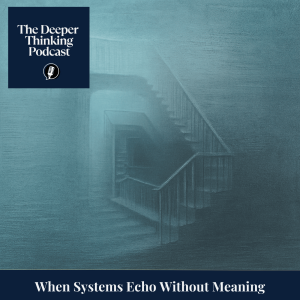
Friday Apr 18, 2025
Friday Apr 18, 2025
When Systems Echo Without Meaning
The Deeper Thinking Podcast
When systems fail, they don’t always stop. Often, they continue—unchanged, unfeeling, echoing protocols long after belief has eroded. This episode explores what it means to remain inside those echoes. Not as a form of resignation, but as a method of listening. Of paying attention to what persists, flickers, distorts. It traces how meaning behaves when its infrastructure collapses, and how rhythm—not resolution—might be what remains.
As Maurice Blanchot writes, disaster is not the event of breaking—but the continuation that follows. Byung-Chul Han calls it an era of transparent burnout. In this episode, systems glitch, but don’t stop. Interfaces work. Schedules run. But something is missing. And inside that absence, a new form of attention takes shape.
Drawing on the hauntological thinking of Mark Fisher, the recursive performativity of Judith Butler, and the plasticity described by Catherine Malabou, this episode is not about fixing what’s broken. It’s about learning to hear what the breakdown reveals. It’s about dwelling in fragments, returning to motifs that no longer resolve, and understanding the glitch not as failure, but as form.
Why Listen?
How systems can collapse yet still perform
Glitch as method—not interruption, but presence
The ethics of listening to systems that echo without meaning
Theory woven through texture, rhythm, and recursive thinking
Further Reading
As an affiliate, we may earn from qualifying purchases through these links.
What Is Called Thinking? by Martin Heidegger — On the impossibility and necessity of staying with broken sense. Amazon link
Plasticity at the Dusk of Writing by Catherine Malabou — On form that forms, breaks, and reforms. Amazon link
Ghosts of My Life by Mark Fisher — On hauntology, cultural memory, and systems that keep going without soul. Amazon link
Listen On:
YouTube
Spotify
Apple Podcasts
Bibliography
Blanchot, Maurice. The Writing of the Disaster. Translated by Ann Smock. Lincoln: University of Nebraska Press, 1995.
Butler, Judith. Gender Trouble: Feminism and the Subversion of Identity. New York: Routledge, 1990.
Fisher, Mark. Ghosts of My Life: Writings on Depression, Hauntology and Lost Futures. Winchester, UK: Zero Books, 2014.
Han, Byung-Chul. The Burnout Society. Translated by Erik Butler. Stanford, CA: Stanford University Press, 2015.
Malabou, Catherine. Plasticity at the Dusk of Writing: Dialectic, Destruction, Deconstruction. Translated by Carolyn Shread. New York: Columbia University Press, 2009.
Ahmed, Sara. Queer Phenomenology: Orientations, Objects, Others. Durham, NC: Duke University Press, 2006.
Noë, Alva. Action in Perception. Cambridge, MA: MIT Press, 2004.
Steyerl, Hito. The Wretched of the Screen. Berlin: Sternberg Press, 2012.

Friday Apr 18, 2025
Friday Apr 18, 2025
The Architecture of Debt Is Not Broken — It Is Working
The Deeper Thinking Podcast
For many young people, debt is not a temporary problem. It is the condition of adulthood itself. In this episode, we explore how debt has supplanted ownership as the foundation of civic identity, economic structure, and personal possibility. Debt does not merely delay the future—it redesigns it. And it does so not as a glitch in the system, but as its intended logic.
This is not a financial advice podcast. It is a philosophical investigation of how David Graeber reframed debt as a moral architecture, how Byung-Chul Han diagnosed fatigue as the affect of freedom, and how Nancy Fraser demands we understand care and extraction as twin forces. We follow the thread of unpaid bills, missed rent, and survival budgets—not as isolated problems, but as the material vocabulary of a deeper social contract.
This episode is about design: of systems, of silence, of what becomes normal. It asks what happens when economic survival becomes the only form of participation. And it listens carefully to those moments—at kitchen tables, in late-night spreadsheets, in involuntary quiet—where something like refusal begins. Not resistance as spectacle, but as a structural reimagining of who we are allowed to be, and what we are allowed to owe.
Why Listen?
How debt became the new architecture of adulthood
Why shame is not a personal flaw but a systemic function
The civic and emotional costs of assetlessness
How care, refusal, and silence become design strategies
Further Reading
As an affiliate, we may earn from qualifying purchases through these links.
Debt: The First 5,000 Years by David Graeber — A sweeping anthropological history of debt, morality, and power. Amazon link
The Burnout Society by Byung-Chul Han — A diagnosis of the neoliberal psyche through fatigue, performance, and control. Amazon link
Cannibal Capitalism by Nancy Fraser — On the extraction of life, care, and environment by capital’s hidden infrastructures. Amazon link
Listen On:
YouTube
Spotify
Apple Podcasts
Bibliography
Graeber, David. Debt: The First 5,000 Years. Brooklyn, NY: Melville House, 2011.
Han, Byung-Chul. The Burnout Society. Translated by Erik Butler. Stanford, CA: Stanford University Press, 2015.
Fraser, Nancy. Cannibal Capitalism: How Our System Is Devouring Democracy, Care, and the Planet—and What We Can Do About It. London: Verso Books, 2022.
The Care Collective. The Care Manifesto: The Politics of Interdependence. London: Verso Books, 2020.
Fisher, Mark. Capitalist Realism: Is There No Alternative? Winchester: Zero Books, 2009.
Eubanks, Virginia. Automating Inequality: How High-Tech Tools Profile, Police, and Punish the Poor. New York: St. Martin’s Press, 2018.
O’Neil, Cathy. Weapons of Math Destruction: How Big Data Increases Inequality and Threatens Democracy. New York: Crown Publishing Group, 2016.
Butler, Judith. The Force of Nonviolence: An Ethico-Political Bind. London: Verso Books, 2020.
Arendt, Hannah. The Human Condition. 2nd ed. Chicago: University of Chicago Press, 1998.
Spade, Dean. Mutual Aid: Building Solidarity During This Crisis (and the Next). London: Verso Books, 2020.
Ahmed, Sara. The Cultural Politics of Emotion. 2nd ed. Edinburgh: Edinburgh University Press, 2014.
Berlant, Lauren. Cruel Optimism. Durham, NC: Duke University Press, 2011.
Tsing, Anna Lowenhaupt. The Mushroom at the End of the World: On the Possibility of Life in Capitalist Ruins. Princeton, NJ: Princeton University Press, 2015.
Morduch, Jonathan, and Rachel Schneider. The Financial Diaries: How American Families Cope in a World of Uncertainty. Princeton, NJ: Princeton University Press, 2017.
Standing, Guy. The Precariat: The New Dangerous Class. London: Bloomsbury Academic, 2011.
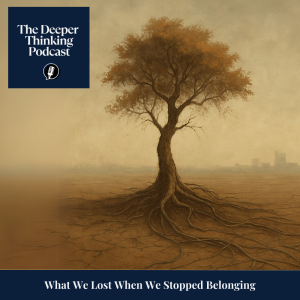
Wednesday Apr 16, 2025
Wednesday Apr 16, 2025
What We Lost When We Stopped Belonging
The Deeper Thinking Podcast
For those who feel the ache of absence—not as emptiness, but as a longing for something once structural, once sacred.
What if loneliness isn’t just a feeling, but a structural breakdown? A collapse in the relational, ecological, and existential architectures that once held us? This episode reframes loneliness not as personal failure, but as the symptom of a deeper disconnection—from each other, from the more-than-human world, and from the systems of meaning that once bound us. Drawing from over forty thinkers in philosophy, ecology, posthumanism, and social theory, we trace how intimacy became transactional, how attention became extractive, and how the self was reframed as sovereign rather than entangled.
Featuring insights from Judith Butler, David Abram, bell hooks, Donna Haraway, Tricia Hersey, and Frantz Fanon, we explore how grief, rest, slowness, and interdependence might offer not escape—but repair. This is not a prescription, but a return to presence. An invitation to listen, dwell, and reorient ourselves toward the sacred weave of relation we’ve forgotten how to feel.
Reflections
Some of the questions that surfaced along the way:
What if loneliness is not an emotion but an ecosystem in collapse?
What happens when connection is replaced by content?
How does capitalism translate intimacy into transaction?
Can rest and grief become acts of resistance in a speed-driven world?
What if healing isn’t internal, but infrastructural?
How do we make kin again—in a culture that forgot the language?
What if we rebuilt belonging not through sameness but through care?
Why Listen?
Reimagine loneliness through ecological, philosophical, and relational frameworks
Trace the emotional consequences of systemic disconnection
Engage thinkers from posthumanism, Indigenous philosophy, and social theory
Rediscover the architecture of belonging as something we build together
Listen On:
YouTube
Spotify
Apple Podcasts
Support This Work
If you'd like to support the ongoing work, you can visit buymeacoffee.com/thedeeperthinkingpodcast or leave a kind review on Apple Podcasts.
Key Thinkers
Judith Butler: Reframes vulnerability as constitutive of the human condition—not a weakness but a connective tissue.
David Abram: Grounds perception in the more-than-human world, reminding us that presence is ecological, not just cognitive.
bell hooks: Urges us to reclaim love as a political and communal force capable of structural repair.
Donna Haraway: Teaches kin-making as an ethics of survival in a relational world we’ve tried to unweave.
Tricia Hersey: Elevates rest as a mode of resistance—against extraction, against urgency, against erasure.
Frantz Fanon: Reminds us that alienation is not just internal—it is colonial, systemic, and lived through the body.
Loneliness is not a flaw. It’s a signal. A longing for the architectures we once built together.
#Loneliness #Belonging #JudithButler #DavidAbram #bellhooks #DonnaHaraway #TriciaHersey #FrantzFanon #Rest #Ecology #MoreThanHuman #TheDeeperThinkingPodcast #Kinship #Philosophy #Posthumanism #Grief #Listening #Attention
Bibliography
Abram, David. The Spell of the Sensuous: Perception and Language in a More-than-Human World. New York: Vintage Books, 1997.
Ahmed, Sara. Queer Phenomenology: Orientations, Objects, Others. Durham: Duke University Press, 2006.
Barad, Karen. Meeting the Universe Halfway: Quantum Physics and the Entanglement of Matter and Meaning. Durham: Duke University Press, 2007.
Bauman, Zygmunt. Liquid Modernity. Cambridge: Polity Press, 2000.
Bachelard, Gaston. The Poetics of Space. Translated by Maria Jolas. Boston: Beacon Press, 1994.
Berry, Thomas. The Great Work: Our Way into the Future. New York: Bell Tower, 1999.
Butler, Judith. Precarious Life: The Powers of Mourning and Violence. London: Verso, 2004.
Crawley, Ashon T. Blackpentecostal Breath: The Aesthetics of Possibility. New York: Fordham University Press, 2016.
Deleuze, Gilles, and Félix Guattari. A Thousand Plateaus: Capitalism and Schizophrenia. Translated by Brian Massumi. Minneapolis: University of Minnesota Press, 1987.
Fanon, Frantz. Black Skin, White Masks. Translated by Richard Philcox. New York: Grove Press, 2008.
Fiumara, Gemma Corradi. The Other Side of Language: A Philosophy of Listening. London: Routledge, 1990.
Freire, Paulo. Pedagogy of the Oppressed. Translated by Myra Bergman Ramos. New York: Continuum, 2000.
Graeber, David, and David Wengrow. The Dawn of Everything: A New History of Humanity. New York: Farrar, Straus and Giroux, 2021.
Haraway, Donna J. Staying with the Trouble: Making Kin in the Chthulucene. Durham: Duke University Press, 2016.
Han, Byung-Chul. The Burnout Society. Translated by Erik Butler. Stanford: Stanford University Press, 2015.
Hersey, Tricia. Rest Is Resistance: A Manifesto. New York: Little, Brown Spark, 2022.
hooks, bell. All About Love: New Visions. New York: William Morrow, 2000.
Illich, Ivan. Deschooling Society. New York: Harper & Row, 1971.
Ingold, Tim. The Life of Lines. London: Routledge, 2015.
Kimmerer, Robin Wall. Braiding Sweetgrass: Indigenous Wisdom, Scientific Knowledge, and the Teachings of Plants. Minneapolis: Milkweed Editions, 2013.
Levinas, Emmanuel. Totality and Infinity: An Essay on Exteriority. Translated by Alphonso Lingis. Pittsburgh: Duquesne University Press, 1969.
Lorde, Audre. Sister Outsider: Essays and Speeches. Freedom, CA: Crossing Press, 1984.
Margulis, Lynn, and Dorion Sagan. Acquiring Genomes: A Theory of the Origins of Species. New York: Basic Books, 2002.
Macy, Joanna. Active Hope: How to Face the Mess We're In without Going Crazy. Novato, CA: New World Library, 2012.
Mbembe, Achille. Necropolitics. Durham: Duke University Press, 2019.
Naess, Arne. Ecology, Community and Lifestyle: Outline of an Ecosophy. Translated by David Rothenberg. Cambridge: Cambridge University Press, 1989.
Pallasmaa, Juhani. The Eyes of the Skin: Architecture and the Senses. Chichester: Wiley, 2005.
Plumwood, Val. Feminism and the Mastery of Nature. London: Routledge, 1993.
Rosa, Hartmut. Resonance: A Sociology of Our Relationship to the World. Translated by James C. Wagner. Cambridge: Polity Press, 2019.
Serres, Michel. The Parasite. Translated by Lawrence R. Schehr. Minneapolis: University of Minnesota Press, 2007.
Shiva, Vandana. Earth Democracy: Justice, Sustainability, and Peace. Cambridge, MA: South End Press, 2005.
Simpson, Leanne Betasamosake. As We Have Always Done: Indigenous Freedom through Radical Resistance. Minneapolis: University of Minnesota Press, 2017.
Solnit, Rebecca. Hope in the Dark: Untold Histories, Wild Possibilities. Chicago: Haymarket Books, 2016.
Stengers, Isabelle. Thinking with Whitehead: A Free and Wild Creation of Concepts. Translated by Michael Chase. Cambridge, MA: Harvard University Press, 2011.
Turkle, Sherry. Alone Together: Why We Expect More from Technology and Less from Each Other. New York: Basic Books, 2011.
Whitehead, Alfred North. Process and Reality. Corrected Edition. New York: Free Press, 1978.
Wynter, Sylvia. “Unsettling the Coloniality of Being/Power/Truth/Freedom.” The New Centennial Review 3, no. 3 (2003): 257–337.









